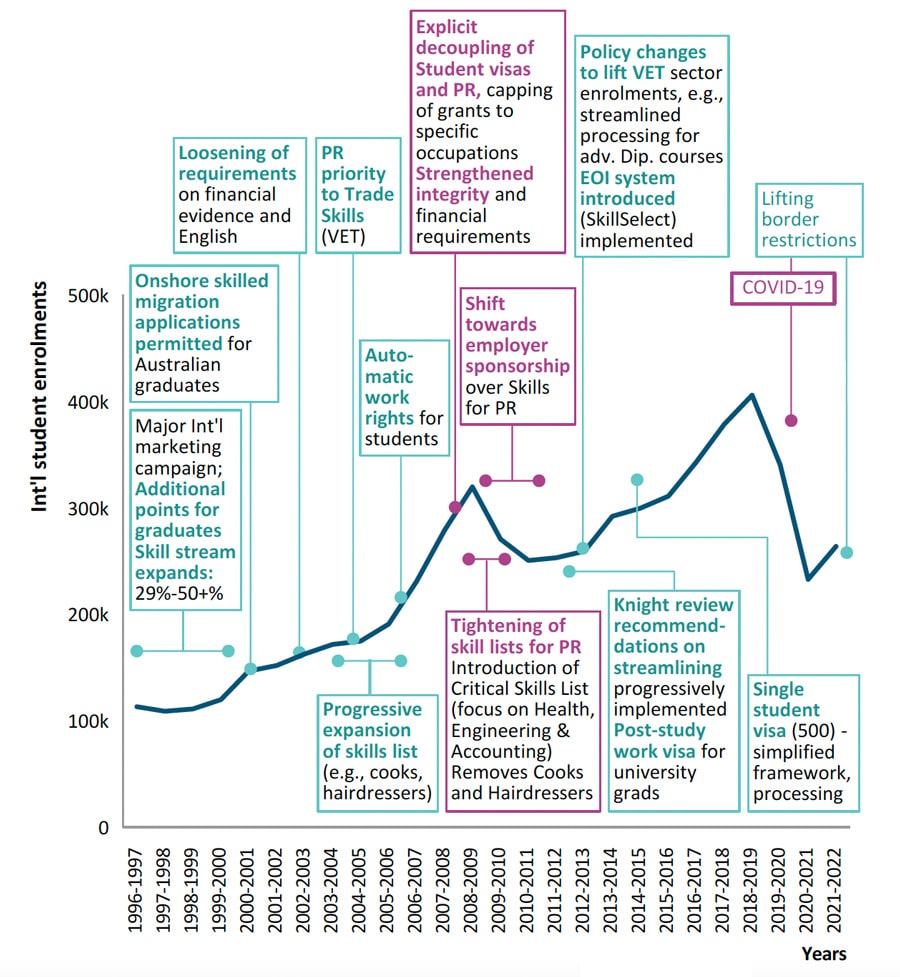Australia plans to tighten rules around student visas
- A formal review of Australia’s of migration system is prompting the Australian government to introduce proposals for reforms to current migration settings
- The review’s recommendations encompass student visas and student migration, and the expected overall effect will be that visa policies will tighten for foreign students in Australia
- Australian Home Affairs Minister Clare O’Neil, however, provided assurance that pathways to post-study work and permanent residence will be streamlined and made more effective for foreign students, and that student supports and career transition services before and after graduation will be improved
In September 2022, Australian Home Affairs Minister Clare O’Neil announced plans for a comprehensive review of the country’s migration system. The findings of that review were released late last month, and they now set the stage for substantial changes to Australia’s policy framework, including student visa settings and procedures.
The report starts with a bang:
"Australia’s migration program is not fit for purpose. The objectives of the program are unclear, and successive governments and policymakers have responded to challenges through piecemeal reforms which have not addressed fundamental underlying issues.
Australia now has a migration program that fails to attract the most highly skilled migrants and fails to enable business to efficiently access workers. At the same time, there is clear evidence of systemic exploitation and the risk of an emerging permanently temporary underclass. Cumulatively, these factors erode public confidence."
The review panel acknowledges the significance and success of Australia's international education sector, but it sets out three areas of concern regarding student migration to Australia.
- The impact of migration settings on the quality of Australian education;
- The extent to which migration settings contribute to international graduates not reaching their potential in the labour market; and
- Too many former students being allowed to stay "long term on a temporary basis."
The panel is essentially concerned that some international students are using visas as a back door for working and migrating to Australia, and that this undermines the quality of education for genuine foreign students. In addition, the panel believes that current policy settings are not geared to selecting the best-fit graduates for permanent residence (i.e., those whose skills are best-aligned with labour market needs and who otherwise have the best chance of success).
The review also underscores the linkages between international student recruitment and migration settings. The following chart highlights policy changes that have variously broadened or tightened students’ access to permanent residence, and the resulting impacts on international enrolments.

Within the context of the current review, the importance of those linkages looms large. Minister O’Neil has stated his intention to respond to the report's recommendations in a phased series of legislative changes in the months ahead.
Speaking at a 27 April press briefing, the Minister said: "Instead of pretending that some students are here to study when they are actually here to work, we need to look to create proper pathways…We want to ensure that high-performing students, with the skills we need, are given the chance to stay. We propose creating simpler, faster pathways for the international students who will have special skills and capabilities we need."
"We will look at tightening the requirements for international students studying in Australia, and ensure that students are actually here to study. Strengthening how the international student system and migration systems interact will be a substantial piece of work that we will share more information on in the coming months."
The Minister added that, "This is not about reducing the number [of international students], but I think it’s inevitable when we lift standards that there might be some implication for numbers. That’s not the target of this. The target of this project is making sure that we have the skills in our country that we need to meet national challenges."
The impact that the changes will have on Australia's attractiveness to international students is impossible to gauge at the moment. This is, in part, because there are also elements in the review's recommendations that may boost the country's appeal. The Minister has spoken, for example, about providing students with more opportunities to gain relevant work experience during their studies, smoothing the transition from study to work, and ensuring improved career services for students and graduates.
The complete set of recommendations relating to student visas and student migration are as follows:
- "Review the Student visa working hours cap, including whether unpaid work-integrated-learning, internships and work experience are counted towards the cap.
- Provide a Temporary Graduate visa automatically upon study completion.
- Align the duration of the Temporary Graduate visa with the time required to identify high potential graduates who will succeed on a permanent skilled visa. Within these parameters, minimise the time former students can remain in Australia on a temporary basis.
- Explore options to provide a certain and direct permanent residence pathway for a very narrowly defined group of students.
- Align the English-language requirements of the Student and/or Graduate visas with skilled visa English language requirements.
- Move from the Genuine Temporary Entrant criterion to a Genuine Student test.
For additional background, please see:
















